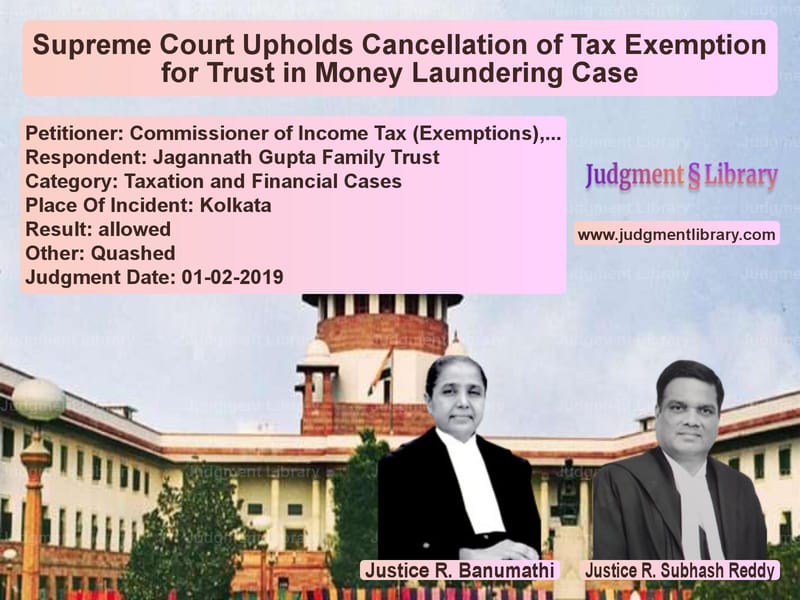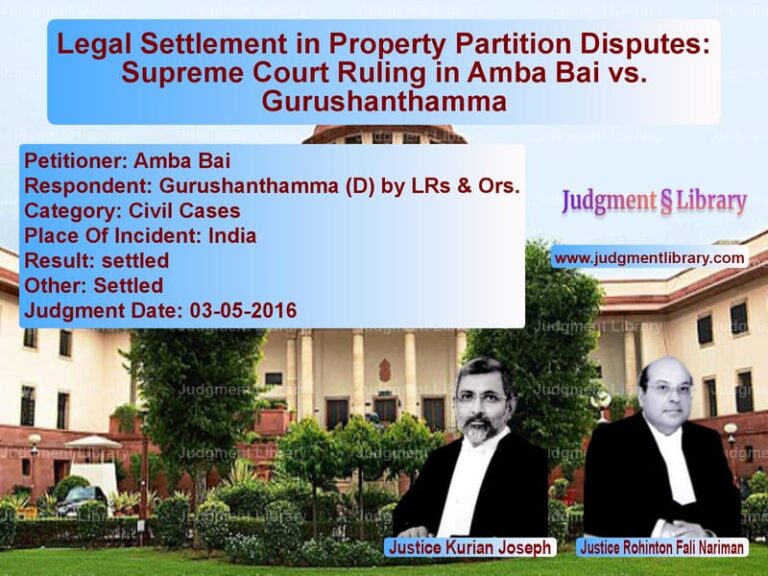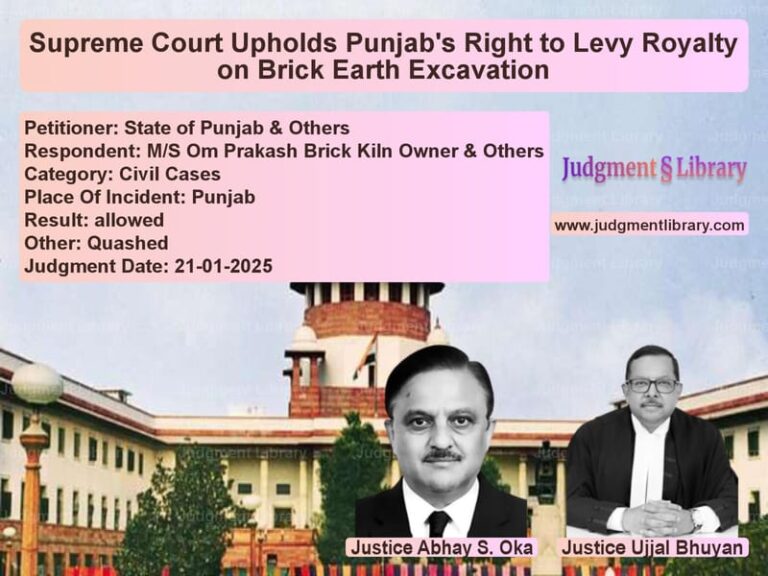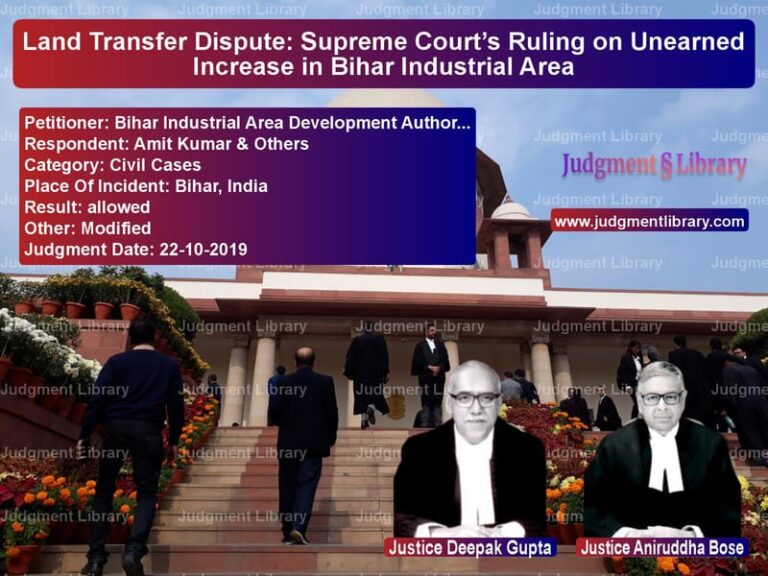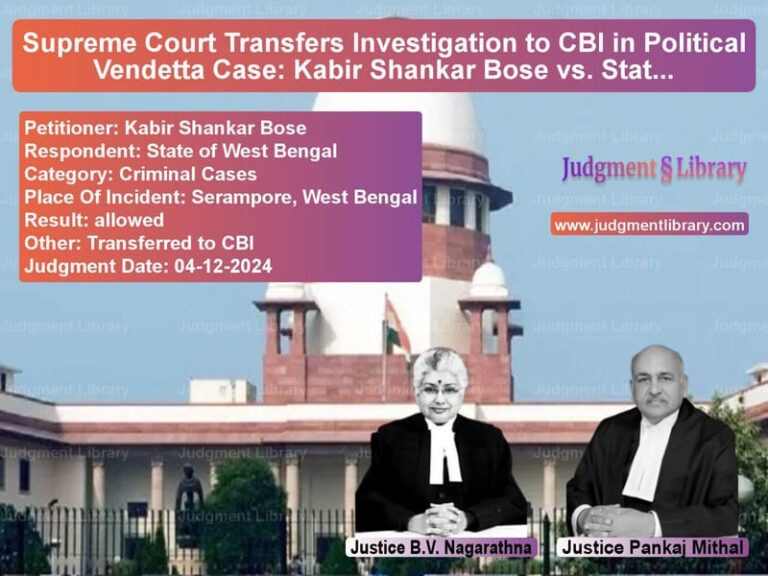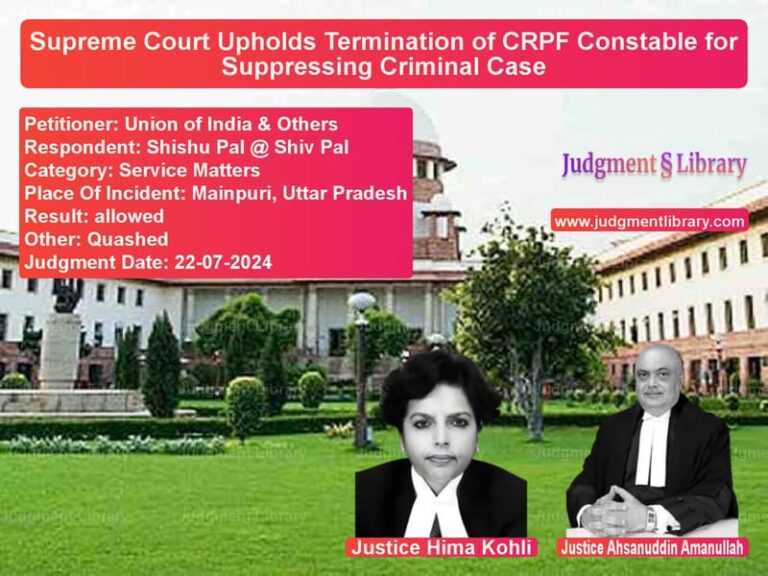Supreme Court Upholds Cancellation of Tax Exemption for Trust in Money Laundering Case
The Supreme Court of India, in the case of Commissioner of Income Tax (Exemptions), Kolkata vs. Jagannath Gupta Family Trust, ruled on the cancellation of a trust’s registration under the Income Tax Act, 1961. The judgment addresses serious allegations of money laundering and misuse of tax-exempt donations, ultimately affirming that a trust engaged in fraudulent financial practices cannot claim tax exemptions under Sections 12AA and 80G of the Act.
Background of the Case
The respondent, M/s. Jagannath Gupta Family Trust, was registered under Section 12AA of the Income Tax Act and was also approved for Section 80G(5)(vi) tax benefits. The trust was set up for public charitable purposes, including medical relief, education, and other public welfare initiatives. It operated an engineering college and claimed exemptions for received donations.
A survey under Section 133A of the Income Tax Act was conducted at the premises of School of Human Genetics and Population Health (SHGPH), Kolkata, by the Investigation Wing on January 27, 2014. During this survey, the tax authorities discovered an entry of Rs. 37,00,000 in donations, which they alleged to be bogus and part of a money laundering scheme.
According to the Commissioner of Income Tax (Exemptions), the donation was a fictitious transaction where the alleged donor never actually donated the money but instead received an equivalent amount in cash from the respondent-trust, with a commission deducted. Consequently, the tax authorities initiated proceedings for cancellation of the trust’s registration under Section 12AA(3) of the Act.
Proceedings Before Tax Authorities
The Commissioner of Income Tax (Exemptions) issued a show-cause notice to the trust on December 4, 2015, questioning the authenticity of its activities and compliance with the objectives of a charitable trust. The key allegations were:
- The trust was engaging in money laundering through fictitious donations.
- The trust had been involved in similar fraudulent transactions for multiple years.
- The trust’s activities were not aligned with the stated charitable objectives.
- The trust had violated the AICTE rules by paying commissions to agents to secure admissions to its college.
The trust responded by claiming that it was not given the opportunity to cross-examine the donor, whose statement was used as evidence against it. Despite this defense, the Commissioner of Income Tax (Exemptions) concluded that the trust’s activities were neither genuine nor conducted in accordance with its objectives and canceled the trust’s registration with retrospective effect from April 1, 2008.
Appeal Before the Income Tax Appellate Tribunal (ITAT)
The trust challenged the cancellation order before the Income Tax Appellate Tribunal (ITAT), Kolkata, arguing:
- The cancellation was based on an ex-parte statement of the donor without giving the trust an opportunity to cross-examine the witness.
- The survey conducted on the trust’s premises did not uncover any irregularities.
- Not all donations were fictitious, and the trust used donations for charitable purposes.
The ITAT ruled in favor of the trust, stating that procedural lapses, such as denying the right to cross-examine the donor, invalidated the cancellation. The ITAT remanded the case back to the Commissioner for fresh consideration.
Appeal Before the Calcutta High Court
Dissatisfied with the ITAT ruling, the trust filed an appeal before the Calcutta High Court. The High Court quashed the cancellation of registration, reasoning:
- The trust’s registration could not be canceled based on a single alleged bogus donation.
- The Income Tax authorities could still assess tax on questionable donations, but that alone was insufficient to prove the trust’s activities were wholly fraudulent.
- The Commissioner had not demonstrated multiple fraudulent transactions that would justify cancellation.
The High Court thus reinstated the trust’s registration.
Supreme Court’s Analysis and Judgment
The Commissioner of Income Tax (Exemptions) appealed before the Supreme Court, arguing that:
- The High Court had incorrectly interpreted Section 12AA(3).
- The trust’s role in channeling unaccounted cash through bogus donations was against public policy.
- Allowing the trust to retain its tax-exempt status would encourage financial misconduct.
The Supreme Court ruled in favor of the Commissioner, setting aside the High Court’s judgment. The Court made the following key observations:
- The High Court’s interpretation of Section 12AA(3) was erroneous, as it focused only on one instance of fraud, while the Commissioner had found systematic misuse of tax exemptions.
- The purpose of tax exemption for charitable trusts is to promote genuine philanthropy, not to facilitate tax evasion.
- The burden of proof lay on the trust to show that its activities were genuine, which it failed to do.
- The Commissioner had sufficient evidence to conclude that the trust was engaged in money laundering.
Thus, the Supreme Court upheld the cancellation of the trust’s registration under Section 12AA(3).
Key Takeaways from the Judgment
- Crackdown on Money Laundering: The judgment reinforces that tax exemptions for charitable trusts must not be misused for fraudulent transactions.
- Strict Interpretation of Tax Exemptions: The Court made it clear that tax authorities have the power to revoke registration when charitable institutions fail to uphold their stated objectives.
- Burden of Proof on the Trust: If a trust claims tax exemption, it must demonstrate that its activities are genuine and transparent.
- Wide Implications: The ruling sets a precedent for tax authorities to scrutinize trusts suspected of financial irregularities.
Conclusion
The Supreme Court’s decision in Commissioner of Income Tax (Exemptions), Kolkata vs. Jagannath Gupta Family Trust is a landmark judgment that underscores the importance of financial integrity in tax-exempt organizations. By affirming the cancellation of the trust’s registration, the ruling ensures that tax exemptions are reserved for institutions engaged in genuine charitable activities, not those involved in fraudulent financial transactions.
Petitioner Name: Commissioner of Income Tax (Exemptions), Kolkata.Respondent Name: Jagannath Gupta Family Trust.Judgment By: Justice R. Banumathi, Justice R. Subhash Reddy.Place Of Incident: Kolkata.Judgment Date: 01-02-2019.
Don’t miss out on the full details! Download the complete judgment in PDF format below and gain valuable insights instantly!
Download Judgment: Commissioner of Inco vs Jagannath Gupta Fami Supreme Court of India Judgment Dated 01-02-2019.pdf
Direct Downlaod Judgment: Direct downlaod this Judgment
See all petitions in Income Tax Disputes
See all petitions in Tax Evasion Cases
See all petitions in Judgment by R. Banumathi
See all petitions in Judgment by R. Subhash Reddy
See all petitions in allowed
See all petitions in Quashed
See all petitions in supreme court of India judgments February 2019
See all petitions in 2019 judgments
See all posts in Taxation and Financial Cases Category
See all allowed petitions in Taxation and Financial Cases Category
See all Dismissed petitions in Taxation and Financial Cases Category
See all partially allowed petitions in Taxation and Financial Cases Category

